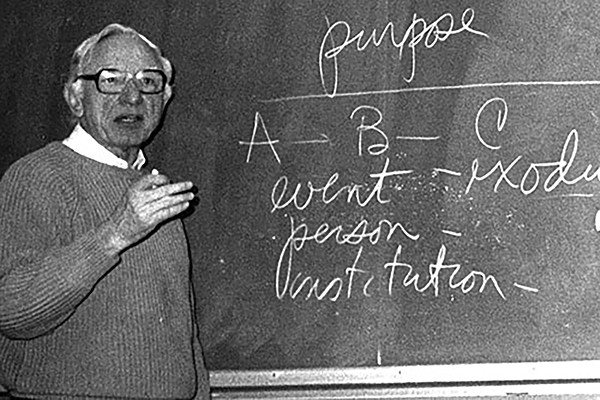
I have come to believe that on every level of being a human person we co-exist with other human persons.
There is a philosophy called sociologism that claims that a person is nothing but a product of the groups to which he or she belongs. Because I believe in human freedom, I cannot accept the view of the human person that sociologism, which is a form of determinism, presents. However, I do think that we are enormously influenced by the groups to which we belong: our families, schools attended, socio-economic groups and, in a special way, the church of which we are members.
The more I think about human activity, the more obvious it is to me that we greatly depend on others and can be deeply influenced by others. I think of our knowledge, our emotional lives, and the actions that structure and shape our environment. On every level of knowledge, we depend on others. Our parents tell us who we are, what it means to be good, what it means to be bad. They present to us for much of our lives what they take to be the most important meanings.
They even tell us who God is.
I went to Catholic grammar school, a Jesuit high school, and two Catholic universities to pursue graduate degrees. It is probably impossible for me to assess with any accuracy how deeply the nuns who taught me in grammar school and the Jesuits who taught me in high school influenced me. The education they gave me changed me for life. Today we are bombarded by the media. What newspaper do we read? What books do we read? What television station do we watch? The amount of information we are exposed to every day is mind-boggling. We try to intelligently weigh the evidence and accept only the truth but this is not easy to do.
We co-exist emotionally. Put simply we can say that if we spend all our time with emotionally healthy people, the office of bishop, priest, and deacon, and a specific authority accompanying each role; but it is not perfectly clear what belongs essentially to each role … and what has become associated with that role through accidental accretion.
Whatever authoritative voice belongs to any group or individual in the Christian community, can operate only within the context of faith. Whether it be bishop or priest or teacher or prophet (if there be such), he can legitimately exercise his authority only by clarifying or deepening the faith of his fellow Christians. His function, whatever position he may occupy, can only be one of witnessing to the reality and to the challenge of the Gospel, or of making more explicit the implications of the Gospel. One cannot legislate faith; one can only witness to the reality of the risen Christ. It is he who
demands faith as a response to what he says and does.” (p. 27)
The members of the Christian community are not perfect and they never will be but what a great blessing it is to accept the Good News that Jesus proclaimed and to play a role in the life of the community. In helping the community to grow and be a stronger Christian presence in the world no one can do everything but everyone can do something.
